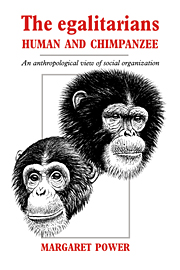Book contents
- Frontmatter
- Contents
- Foreword by A. Montagu
- Acknowledgments
- Part 1 Methods and prefatory explanations
- Part 2 The human foragers
- Part 3 The changing social order
- Part 4 The behavior of wild and provisioned groups: a theoretical analysis
- Part 5 The mutual dependence system
- Part 6 The egalitarian chimpanzees
- Part 7 Probabilities, possibilities and half-heard whispers
- Notes
- References
- Index
Part 2 - The human foragers
Published online by Cambridge University Press: 18 December 2009
- Frontmatter
- Contents
- Foreword by A. Montagu
- Acknowledgments
- Part 1 Methods and prefatory explanations
- Part 2 The human foragers
- Part 3 The changing social order
- Part 4 The behavior of wild and provisioned groups: a theoretical analysis
- Part 5 The mutual dependence system
- Part 6 The egalitarian chimpanzees
- Part 7 Probabilities, possibilities and half-heard whispers
- Notes
- References
- Index
Summary
General anthropological understandings
This part of the book is a brief summary of anthropological understandings regarding the social behavior and organization of foragers, gatherer–hunters, who lived by the most simple full form of human organization, the immediate-return system, at the time they were studied. More detailed data from the field studies of these groups are inserted throughout the text, wherever they illuminate aspects of the social behavior and organization of chimpanzees.
Anthropologists consider the ancient foraging (gathering–hunting) way of life as the most successful and longitudinal adaptation humans have ever achieved. Indeed, until the advent of the age of agriculture, approximately 10,000 years ago, all peoples everywhere on earth lived by a foraging mode (Murdock 1968). Today, foraging societies have all but vanished. There remain only a few, small, scattered groups, in environments climatically so inhospitable as not to be much desired by agriculturists or industrialists, and even these areas are being preempted rapidly (see figure 4).
There is a general agreement among anthropologists that all foraging peoples live in small groups, and follow a nomadic pattern known as fission and fusion. Another point on which there was, until recently, complete agreement is that, whatever the foraging construct is, it ‘is not a corporation of persons who are bound together by the necessity of maintaining property’ (Lee and DeVore 1968:8).
There is considerable diversity among foraging models. Some anthropologists suggest lineage models, local groups which are organized around central members of a single lineage, and some who affiliate through marriage alliances.
- Type
- Chapter
- Information
- The Egalitarians - Human and ChimpanzeeAn Anthropological View of Social Organization, pp. 37 - 50Publisher: Cambridge University PressPrint publication year: 1991



